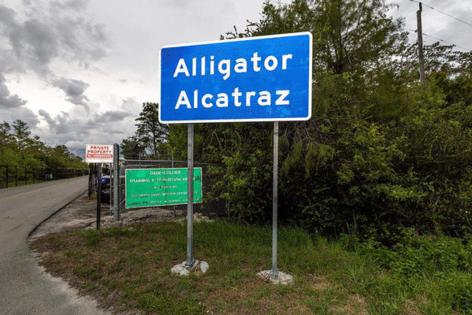Republican states join in the fight to keep the lights on at Alligator Alcatraz
Published in News & Features
More than 21 Republican states and attorneys general have joined the DeSantis administration’s efforts to keep the lights on at Alligator Alcatraz after a district judge ordered the state to wind down operations and stopped new detainees from being held at the detention facility.
In a brief filed Tuesday by Indiana Attorney General Theodore Rokita to the Eleventh Circuit Court of Appeals, the states jointly supported the DeSantis administration’s argument that Florida was not obligated to conduct an environmental review mandated for major federal projects when it built the site to house immigrant detainees for the Trump administration.
The brief — calling for the appeals court to stay District Judge Kathleen Williams’ injunction — stated that her decision was “highly concerning” and an attempt to render the National Environmental Policy Act a “blunt and haphazard tool.”
“The district court’s injunction disregards Congress’s decision to impose obligations only on the federal government and to withhold a cause of action for enforcing NEPA against States,” the filing stated.
The decisions by the other states to intercede in the case hints at the broader implications of Williams’ order, as the Trump administration, in its call for states to aid in its mass-deportation efforts, has aimed to replicate Alligator Alcatraz and erect similarly laconically named temporary detention sites in other states.
“Speedway Slammer” in Indiana. “Cornhusker Clink” in Nebraska. “Louisiana Lockup” in Louisiana. DeSantis has also announced plans for two new detention centers in North Florida: “Deportation Depo” and “Panhandle Pokey.”
The DeSantis administration quickly filed a notice of appeal after Williams’ decision in August, which granted a victory to environmental groups and the Miccosukee Tribe. The plaintiffs argued that the temporary detention center had been constructed without an environmental impact assessment as required by NEPA and that it caused ‘irreparable harm’ to the Everglades wetlands.
The state filed an expedited motion for Williams to pause her order while the appeals court was reviewing their appeal, but the judge again sided with the environmental groups.
The state and federal governments said in August that they were adhering to the court’s order, but planned to fight it in court.
In their second attempt to keep the controversial site operational, the state filed an expedited motion with the appeals court requesting it pause Williams’ order while the merits of the appeal were being argued. In the motion to stay the order, they stated that the case was filed in the wrong venue, NEPA does not apply to states and that the environmental groups failed to demonstrate the claim of “irreparable harm” to the Everglades ecosystem.
The states of Indiana, Alabama, Alaska, Arkansas, Georgia, Idaho, Iowa, Kansas, Kentucky, Louisiana, Missouri, Montana, Nebraska, North Dakota, Ohio, Oklahoma, South Carolina, South Dakota, Tennessee, Texas, West Virginia and Wyoming agreed with that argument in their support brief.
“Florida has chosen to construct a facility on state land. The district court exceeded its authority in enjoining state actions and decisions not subject to NEPA,” they stated.
The lawyers for the environmental groups disagreed in their opposition motion, arguing that the state built the facility in coordination with and at the request of the federal government. They stated the district court agreed with their evidence that Immigration and Customs Enforcement supervised the site, and the state was promised reimbursement from the federal government for costs related to the site.
The appeals court review is now one of four legal battles challenging the legality of the operations of the facility built on an airstrip in the Big Cypress National Preserve in late June.
In another lawsuit filed by immigration advocacy groups, they accused the state and federal governments of a lack of due process for detainees at the facility. Part of the case was dismissed, and the remaining claims were moved to the Middle District of Florida. In that case, in a joint status report between the state and the immigrant advocacy groups on Tuesday, the state stated it was “confident that the Eleventh Circuit will stay, and eventually overturn, the preliminary injunction.”
Another case filed in August by the same immigrant advocacy groups challenged the DeSantis administration’s authority to operate and detain immigrants at the facility.
In a press conference on Tuesday, DeSantis told reporters that Alligator Alcatraz was still operational, but the Department of Homeland Security had not been sending in new detainees.
“The mission continues,” DeSantis said.
_____
©2025 Miami Herald. Visit miamiherald.com. Distributed by Tribune Content Agency, LLC.







Comments